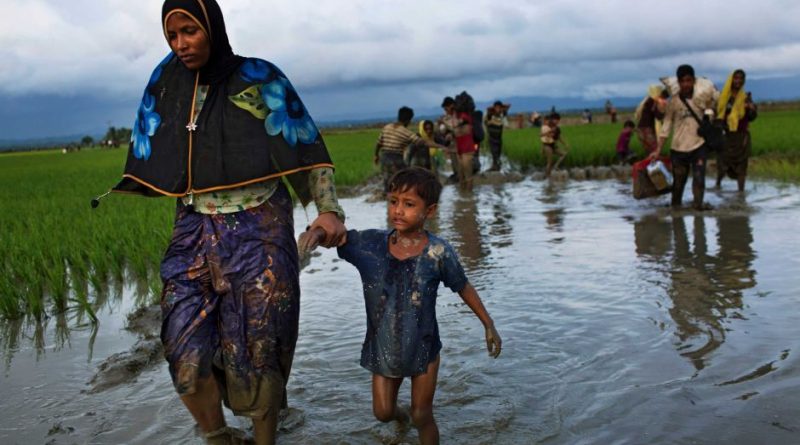The Diplomacy Brief: Rohingya Crisis, Joseph Nye, Kurdish Independence, and Counter Terrorism
“A Friendless People”
This month was certainly not the first time the Rohingya faced persecution at the hands of the government of Myanmar, but it was a significant escalation. In response to an attack by the Arakan Rohingya Salvation Army (ARSA), A Rohingya militant group, on August 25th Burmese Security forces began a crackdown on what they claimed to be insurgent fighters. The counter-insurgency offensive and its subsequent escalation led to a max exodus with 100,000s of Rohingya fleeing over the border into Bangladesh. Those fleeing have claimed the army’s campaign is targeting civilians by putting whole villages to the torch, a fact corroborated by satellite images from Human Rights Watch. As more refugees escape Rakhine, so do more stories of beatings, executions, and rapes at the hands of the army.
Some analysts claim this outbreak of violence, that may border on genocide, is a long time coming. The Rohingya have long been maligned by the Burmese government, which does not recognize them as one of Burma’s 135 ethnic groups, preferring instead to label them foreign interlopers from Bangladesh. The Rohingya are also derided for their Muslim faith. Radical Buddhist monks, like those of Ma Ba Tha, have often railed against them claiming they are invaders who wish to conquer the country, steal Burmese women and Islamize their culture. Since the country’s transition to democracy, there has been a surge in Buddhist nationalism that has heightened tensions, with anti-muslim pogroms erupting sporadically. As conditions deteriorated many international observers became more alarmed, a mission from the United States Holocaust Museum in 2012 found that “many preconditions for genocide are already in place.”
As more and more information leaks out of Rakhine, the international community has been horrified and condemned the violence. Secretary-General Guterres, the Dalai Lama and a host of other world leaders, have condemned the violence. In capitals across the Muslim world, many have rallied in the streets in solidarity with the Rohingya. Turkish President Erdogan even went so far as to say the government of Burma is committing genocide. On Monday Zeid Ra‘ad al-Hussein, the United Nation’s High Commissioner on Human Rights told the Human Rights Council in Geneva this was a “textbook example of ethnic cleansing.”
One of the most striking elements of the crisis is that the de-facto leader of Myanmar, Aung San Suu Kyi, a Nobel laureate, whose vigil for democracy, widely praised by the international community, helped lead Myanmar out from military rule, is now accused of being complicit in genocide. Although she lacks the formal power to rein in the military, some believe her voice could pull the situation back from the brink. Many of her fellow Nobel laureates including, Malala Yousafzai, and Archbishop Desmond Tutu, have pleaded for her to intercede on the Rohingyas behalf. So far, she remains silent.
In this week’s Diplomacy Brief we have compiled some opinions pieces on this humanitarian and moral disaster.
Opinions on the Rohingya Crisis
- Writing in the New York Times, Columnist Nicholas Kristoff documents A Nobel Peace Prize Winner’s Shame. Mr. Kristof’s view summarizes well the sentiment of many western human rights and democracy advocates about Aung San Suu Kyi’s silence in the face of genocide.
- The Editorial Board of the Dhaka Tribune calls for Bangladesh to fully open its borders to the fleeing Rohingya in an editorial simply titled Let Them In.
- Joe Freeman, a Journalist based in Rangoon, writing for the Atlantic asks Can Anyone Stop Burma’s Hardline Buddhist Monks? Freeman discusses how radical Buddhists groups like Ma Ba Tha are inflaming tensions between Buddhists and Muslims, driving a narrative that what is taking place is a struggle to preserve Buddhism and Burma from Islamization.
- The editors of the Economist argue that Aung San Suu Kyi and her foreign admirers must help the Rohingyas. They both admonish Ms. Suu Kyi for her silence and western governments that are reluctant to act, fearing it will undermine Myanmar’s new, fragile democracy. Such arguments are poor, and the editors rightly claim, “Democracy is of little worth if it entails mass displacement and slaughter.”
What we are reading in IR
- Writing for Project Syndicate, one of the top scholars in IR, Joseph Nye, asks the question, How Much Does Trump Matter? Nye poses a question that has raged in IR since its birth, what is more important, leaders or structural forces? Dr. Nye believes that leaders do indeed matter, quoting Robert Frost that, “when two roads diverge in a wood, taking the one less traveled can sometimes make all the difference.”
- Throughout the summer Iraqi Kurds prepared for a referendum on independence that will be held on Sept. 25. Facing opposition from Baghdad, Tehran, and Ankara, Kurds in Iraq are moving to take matters into their own hands, crossing off nationalities and embracing their ethnicity. Steven Cook of Council on Foreign Relations, looks into the dynamics of Kurds’ bid for independence, hinting that a new chapter in Iraq’s internal struggle is upon us.
- Chris Meserole of the Brookings Institution, for the 5 of 45 Podcast, reflects on the September 11th terrorist attacks sixteen years ago and discusses the changing tactics of terrorists since then. Meserole explains how the Islamic State has effectively “repackaged jihadism for the smartphone era” while also shifting to low-tech methods. He offers recommendations on how to combat this new era of terrorism.
Compiled by Dennis Meaney

